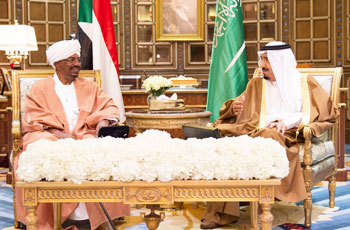Sudan confirms participation in regional military campaign against Yemen’s Houthi
March 26, 2015 (KHARTOUM) – The Sudanese foreign minister Thursday confirmed the reported military participation led by the Saudi Arabia on the Shiite Houthi militants who control the neighbouring Yemen since September 2014.

Karti added that Khartoum decision to participate in this military campaign was triggered by “Sudan’s proximity to Saudi Arabia, the historical close ties (between the two countries) and the danger that threatens all of the region and Saudi Arabia specifically”.
The minister further said Sudan that the purpose of its participation in this war is to defend the security of Saudi Arabia, Sudan’s security and the security of the region in general.
Saudi Arabia’s state news agency (SPA) said that Sudan, Jordan, Morocco, Egypt and Pakistan are prepared to participate in a potential ground offensive in Yemen.
While the Saudi-owned al-Arabiya TV reported that 3 fighter jets from Sudan took part in the air strikes along with dozens of planes from Egypt, Morocco, Jordan, Kuwait, the United Arab Emirates, Qatar and Bahrain.
The Sudanese president Omer Hassan al-Bashir Wednesday concluded a one-day state visit to Saudi Arabia today in which he met with King Salman Bin Abdel Aziz and his son Mohamed who is the kingdom’s defence minister.
Bashir is still in Saudi Arabia for a private visit to perform religious pilgrimage in Mecca. after which he will leave for Egypt to participate in the Arab summit.
The trip represents a thaw in relations between the two countries which has been tense in recent years because of Khartoum’s close ties with Iran.
In the past there were also reports that Sudan has been providing weapons to Houthi rebels on behalf of Iran.
Few hours ago, the Saudi ambassador in Washington Adel al-Jubeir announced at a press conference that a coalition consisting of ten countries have joined hands to assist the internationally recognized Yemeni government of President Abedrabbo Mansour Hadi.
Jubeir declined to say the names of non-Gulf countries which participated.
“We will do whatever it takes in order to protect the legitimate government of Yemen from falling,” he said.
A statement issued in Riyadh in the name of Saudi Arabia, Qatar, Kuwait, Bahrain and the United Arab Emirates – the Gulf Cooperation Council (GCC) countries without Yemen’s neighbour Oman – said they had been asked for help by Hadi’s embattled government.
Yemen’s slide toward civil war has made the country a crucial front in mostly Sunni Saudi Arabia’s rivalry with Shiite Iran, which Riyadh accuses of stirring up sectarian strife throughout the region and in Yemen with its support for the Houthis.
The crisis now risks spiraling into a proxy war with Shiite Iran backing the Houthis, and Saudi Arabia and the other regional Sunni Muslim monarchies supporting Hadi.
In a letter to the U.N. Security Council on Tuesday, Hadi said he had asked Arab states “to provide immediately all means necessary, including military intervention, to protect Yemen and its people.”
Hadi cited Article 51 of the U.N. Charter, which covers an individual or collective right to self-defence against armed attack, as his legal justification.
(ST)
